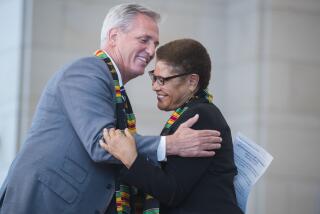In Repaying Favors, Clinton Widens His Personal Network
- Share via
WASHINGTON — For more than a year, William J. Jefferson had been working behind the scenes to secure a seat on one of the House of Representatives’ most prized panels, the Ways and Means Committee. But for all his efforts, it promised to be tough going for a little-known Democratic congressman from Louisiana until a friend offered to put in a good word for him.
That friend was Bill Clinton, who owed one of his early presidential campaign supporters a favor.
According to several House sources, the President-elect made a couple of well-timed appeals on behalf of the junior lawmaker to House Speaker Thomas S. Foley (D-Wash.) and committee Chairman Dan Rostenkowski (D-Ill.).
The gesture was nothing short of extraordinary (“Unbelievable,” one committee member said.) and Jefferson got the appointment he wanted. Clinton, got another ally on a committee likely to be critical to his domestic programs.
The arrival of a new Administration often elevates some members of Congress to prominence and influence because they happen to have personal ties to the incoming President. Perhaps the best example in recent years was former Sen. Paul Laxalt (R-Nev.), who chaired no committees and held no major leadership posts but was enormously powerful as the oracle for those on Capitol Hill who wanted to understand and persuade Ronald Reagan on touchy issues.
With Clinton, no one senator or representative holds such a clear claim to the title of First Friend, although Arkansas Sen. David Pryor comes closest. He first met the President-elect in front of the fire station in Arkadelphia, Ark. Clinton was 19 years old and handing out campaign flyers for a gubernatorial candidate.
What is most notable about Clinton’s personal network in Congress is its size and diversity. From his days in college, he has kept what Pryor described as “the best Rolodex in town.”
The benefits run both ways, said Sen. John B. Breaux (D-La.). He and Clinton are part of the Democratic Leadership Council, a clique of politicians drawn together by their moderate-to-conservative leanings and made more influential by the ascendancy of their former chairman to the White House.
“The good thing about that is that these are personal relationships,” said Breaux, the council’s current chairman. “We can honestly go up to him and say: ‘This is dumb, and this is not going to work.’ ”
Veterans in Congress say that is precisely the sort of sounding board that former President Jimmy Carter lacked. Instead, a Congress controlled by his own party proved to be one of his chief frustrations, and often stood in the way of his proposals.
With few personal links to Capitol Hill, Carter often seemed tone-deaf to its political chords.
Clinton’s relationships with some lawmakers span decades.
In 1970, when Clinton was a law student at Yale University, he volunteered to work in the campaign of Joseph I. Lieberman, an underdog running against an incumbent state senator in Connecticut. Lieberman won and did not forget Clinton’s effort. Last January, when the Clinton campaign was at its lowest point, Lieberman--now a U.S. senator from Connecticut and also a Democratic Leadership Council member--became the first non-Southern senator to endorse the Arkansas governor.
“It’s a real pleasure for me to repay a debt I’ve owed Bill Clinton since 1970,” Lieberman said then.
More to Read
Get the L.A. Times Politics newsletter
Deeply reported insights into legislation, politics and policy from Sacramento, Washington and beyond. In your inbox twice per week.
You may occasionally receive promotional content from the Los Angeles Times.










